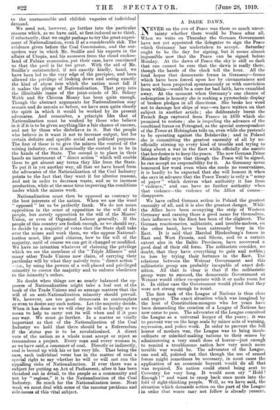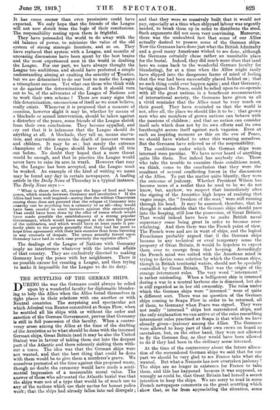A DARK DAWN.
NEVER on the eve of Peace was there so much uncer- tainty whether there would be Peace after all. When we write on Thursday the German Government have not yet appointed the delegates to sign the Peace which Germany has undertaken to accept.. Saturday ought to be the clay for signing, but it seems almost impossible now that the Peace can be signed before Monday. At the dawn of Peace the sky is still so dark that one cannot be sure that the dawn is really there, though the hands of the clock tell the hour. All the fond hopes that democratic forms in Germany—forms which have been forced upon her by circumstances and have not been projected spontaneously or with conviction from within—would be a cure for bad faith, have crumbled away. At the moment when Germany's one chance of redemption is honesty she is making a pyrotechnic display of broken pledges in all directions. She broke her word not to damage her ships of war—we have written on that subject in another article ; she deliberately burnt the French flags captured from France in 1870 which she promised to restore ; she is impeding the advance of the combined forces on Petrograd, as the special correspondent of the Times at Helsingf ors tells us, even while she pretends to be operating against the Bolsheviks ; and in Poland she is committing the greatest enormity of all by un- officially stirring up every kind of trouble and trying to bring about a war in the East while officially she asserts that her desire is to keep the peace. The new German Prima Minister flatly says that though the Peace will be signed, he can accept no responsibility for it. As Germany never honoured her word even when she made no reservations, it is hardly to be' expected that she will honour it when she says in advance that the Peace Treaty is only a "scrap of paper" which derives what authority it has from "violence," and can have no further authority when that violence—the violence of the Allies of course— disappears.
We have called German action in Poland the greatest enormity of all, and it is also the greatest danger. While the Allies have been occupying the strip of Western Germany and earning there a good name for themselves, their influence in the East has been of the slightest. The German reactionaries, militarists, and trouble-makers, on the other hand, have been extremely busy in the East. It is said that Marshal Hindenburg's forces in East and West Prussia, and. Silesia, and to a certain extent also in the Baltic Provinces, have recovered a good deal of their old form. The militarists consider, no doubt, that they have everything to gain and nothinz, to lose by trying their fortunes in the East. The relations between the Weimar Government and this militaristic group are probably incapable of exact defi- nition. All that is clear is that if the militaristic group were to succeed, the democratic Government at Weimar would either co-operate with it or make room for it. In either case the Government would plead that they were not strong enough to resist.
The first task of the League of Nations is thus clear and urgent. The exact situation which was imagined by the host of Constitution-mongers who for years have been demanding the creation of a League of Nations has now come to pass. The advocates of the League conceived the League as a universal keeper of the peace ; it was to prevent war on the large scale by minor acts of warning, repression, and police work. In order to prevent the full horror of modern war, the League was to bring insub- ordinate or mischief-making nations to their senses by administering a very small dose of horror—just enough to remind a troublesome nation how very much more terrible war would be. The advocates of the League, one and all, pointed out that though the use of armed forces might sometimes be necessary, in most cases the application of an economic boycott would do all that was required. No nation could stand being sent to Coventry for very long. It would soon cry " Hold ! Enough I " and want to creep back once more into the fold of right-thinking people. Well, as we have said, the situation which demands' action on the part of the League in order that worse may not follow is already present. It has come sooner than even pessimists could have expected. We only hope that the friends of the League will not now shrink from the logic of their conclusions. The responsibility resting upon them is frightful. They have persuaded the world to do away with the old balance of power, to minimize the value of the old system of strong strategic frontiers, and so on. They have replaced that system with a League, and months of unceasing discussions have been spent by the best brains and the -most experienced men in the world in drafting the League. For our part, we have always thought the League too ambitious, and should have preferred a simple understanding aiming at exalting the sanctity of Treaties, but we are determined to do our best to make the League a triumphant success. Yet what can those who think with us do against the determination, if such it should turn out to be, of the advocates of the League of Nations not to work their own scheme ? There are many signs that this determination, unconscious of itself as we must believe, really exists. Whenever it is proposed that a measure of coercion, however slight it may be, whether by means of a blockade or armed intervention, should be tairen against a disturber of the peace, some friends of the League shrink from their own conclusions. They become appalled, and cry out that it is infamous that the League should do anything at all. A blockade, they tell us, means starva- tion, and starvation means the death of innocent women and children. It may be so ; but surely the extreme champions of the League should have thought all this out before. No doubt they hoped that a mere threat would be enough, and that in practice the League would never have to raise its arm in wrath. However that may be, the League has been accepted, and the League must be worked. An example of the kind of writing we mean may be found any day in certain newspapers. A leading article in the Daily News of Thursday is a typical instance. The Daily News says :— "What is there after all, except the hope of food and bare peace, which stands between Germany and revolution ? If the Allies had been well inspired—seeing that the wildest Chauvinist among them does not pretend that the relapse of Germany into anarchy can be anything but a calamity to us all—they would have been careful to erect barriers against this catastrophe. That could have been done by the offer of terms which would have made possible the establishment of a strong popular Government, which would have sapped at the root the power of the militarists, and which would have at least made it per- fectly plain to the people generally that they had far more to hope from agreement with their late enemies than from listening to any counsels of despair. The terms actually forced upon Germany have had in each case precisely the opposite effect."
The dealings of the League of Nations with Germany imply no interference whatever with the internal affairs of that country. They are exclusively directed to making Germany keep the peace with her neighbours. There is no possible excuse for creating a League, and then trying to make it impossible for the League to do its duty.







































 Previous page
Previous page